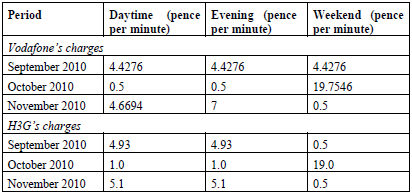This article is more than 1 year old
Telefonica fails in bid to claw back 'flip-flop' 2010 termination charges
Only clean player got taken to the cleaners - that's OK
Ofcom acted properly when setting mobile termination rates - the money one operator must cough to another for terminating a call on its network - the Competition Appeal Tribunal has ruled. The UK's second-largest telco, Telefonica/O2, had appealed to the tribunal over Ofcom's ruling in a dispute between the big Blighty-side mobe players.
O2 was the only one of the four major mobile companies which ended up losing out after it failed to exploit a loophole in the cap on mobile termination rates which contributed so much to all the other firms' coffers. It seems that Ofcom decided on a cap that was a "maximum average", meaning operators could flip-flop their charges.
O2, the operating brand of Telefonica UK, has failed to convince the Competition Appeal Tribunal that Ofcom was at fault for failing to redress the losses it incurred by playing to the spirit, rather than the letter, of termination rate rules while the other operators had noticed that quirks of the calendar provided the opportunity to squeeze the competition, and squeeze it hard.
The dispute goes back to 2007, but the critical year was 2010 when Ofcom mandated average termination rates calculated over a month, rather than specific rates - allowing Vodafone and Three to bump up their rate by more than 40 times and obliging O2 to pay it.
The termination rate is the money paid to operator B, by operator A, when its customers call customers of operator B. Operator B can't be trusted to set that rate as it could ask for something stupid to drive out competition, so these days Ofcom mandates an exact rate for each operator: but back in 2010 the rate was averaged over the month, based on last year's call numbers.
And therein lies the problem. Call numbers for evenings and daytimes are consistent, but October 2010 had one fewer weekend than the previous year, resulting in fewer calls during that month's weekends and thus enabling Vodafone and Three to jack up their interconnect rate proportionally:

Check out the weekend rate on that. Full transcript is available, but very dull
This practice, known as "flip flopping", wasn't disputed, and the operators were all obliged to pay each other the higher rate with the notable (and noble?) exception of Telefonica O2 as the CAT judgement explains:
"For reasons which were not explained to us, Telefónica alone of the four national [operators] in the UK decided to eschew the practice of flip-flopping."
But none of what happened was illegal, so Ofcom had no obligation to investigate as the Tribunal concludes:
"The whole point of flip-flopping was that it represented an attempt to exploit the existing charge control, not to breach it; and it was in our view an entirely reasonable assumption, in the absence of positive evidence to the contrary, that Vodafone and H3G would have taken good care to ensure that the disputed charges complied with the letter of the charge control."
So Ofcom was right not to investigate and Telefonica's appeal failed.
The average-rate loophole was firmly closed last year when Ofcom mandated a descending rate which will bottom out at .7 of a penny per minute come 2015, at which time we can kick off the whole debate again. ®
